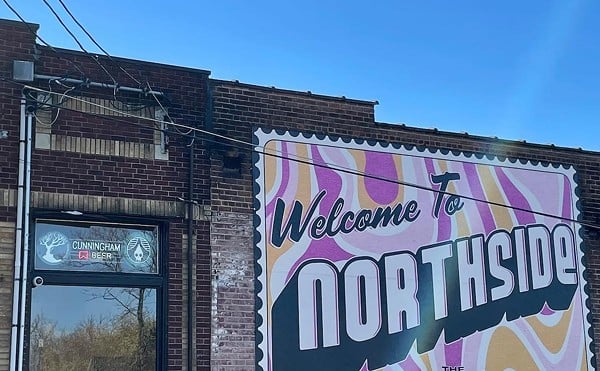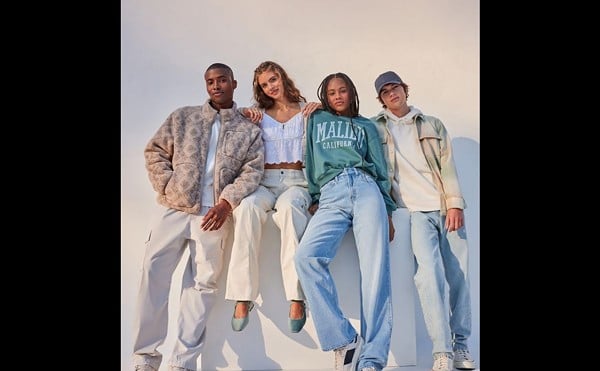|
By any standard imaginable, Sonic Youth is an anomaly. A radical art project begun in 1981 by guitarists Lee Ranaldo and Thurston Moore and bass player Kim Gordon — the indispensable Steve Shelley became their third and forever drummer in 1986 — Sonic Youth were a noisy, No-Wave band from New York, more interested in richly textured shards of dissonance than any semblance of conventional song structure.
Yet 22 years later, the last 13 with the major label bigwigs at Geffen Records, Sonic Youth stands as one of the most respected and creatively vital bands of the era. Gordon probably summed up their legacy best when she once said, "If anything, we were influential in showing people that you can make any kind of music you want."
Last year saw the freshly-minted five-piece — producing guru/multi-instrumentalist Jim O'Rourke is the first new Youth since the Reagan administration — continue to blaze its unique path, releasing their 16th full-length, Murray Street, a stellar collection of psyched-out guitar epics which often recalls the their finest hour, 1988's Daydream Nation.
CityBeat recently spent a few minutes with Gordon via phone from the western Massachusetts home she shares with Moore, her longtime husband and bandmate. The calm, quiet speaking voice emanating through the receiver was somewhat surprising, given that this is the same tuff girl who once demanded to "know the exact dimensions of hell."
CityBeat: Murray Street seems to be a bit more cohesive, as a listening experience, than some of your other stuff. Any theories as to why?
Kim Gordon: Well, like, five of the songs were going to be on a solo record Thurston was writing. But he decided at some point that they would be better if he brought them in and the rest of the band worked on them.
He actually wrote them all on acoustic guitar, and then we kind of played around with them and arranged them and brought our parts to them. So I guess that's what gives them a certain cohesiveness.
CB: The other obvious difference is the addition of Jim (O'Rourke). How'd that happen?
KG: It's great to be in a band for 20 years and add a new member. Jim just sort of fits right in, in a natural way. He's such a musician's musician, which none of us are. So that really adds another element that's fun. And he gets along with everyone, and he's pretty sensitive to everyone's input.
CB: You mentioned the band being around for 20 years. How has music, in a cultural context, changed over that time?
KG: Things haven't really changed much. There's commercialization of music, and then there's not. Basically since the end of the '70s it's been, 'How do you market to the youth culture,' and that's what a large part of music has become.
CB: How do you think technology, specifically the Internet, will affect music in the future?
KG: I think that's one thing that's helped proliferate the underground. Kids can seek out stuff on their own through the Internet instead of it being marketed to them. They don't have to accept what's given to them on MTV. They can use the Internet as a tool to seek out different, weird things.
CB: You guys have always been interested in art, and the melding of art and pop culture. Are you concerned that artists are being marginalized more than ever in our current cultural climate?
KG: When has it not (been marginalized), really? But, yes, I am concerned. I feel bad for our culture. Things seem to go through trends; it's very reactionary right now. Also the country has a very short attention span. I just hope we withstand the Bush era.
CB: I recently reread Michael Azerrad's book (Our Band Could Be Your Life) on the '80s underground scene.
KG: (Laughs)
CB: Would you say that his portrayal of you guys was fair and accurate?
KG: No. I actually haven't read the whole thing. I sort of skimmed it. I told him I didn't want to do an interview with him because most people who write about that time — the '80s — they weren't there. There's no context. They don't know what the context was. So I think that's part of his problem. But the history of the '80s, I mean, the more people who write books from their own personal history the better. I think that's much more interesting. And that's my only problem with Michael's piece, or his book, is that when writers like that put out books, there's more of an official, 'OK, this is it,' when it's really not. It's just as subjective as anything else.
CB: Do you think touring is as rough for underground bands these days as it was for you guys early on?
KG: It's interesting when you see new bands, and they'll play somewhere and there will be, like, 10 people there or something. But that could be a really crucial gig to those 10 people who are there. And they could tell 10 another people. I still think that's a really interesting and exciting thing that happens.
SONIC YOUTH plays Bogart's on Saturday with Quix*O*Tic.





